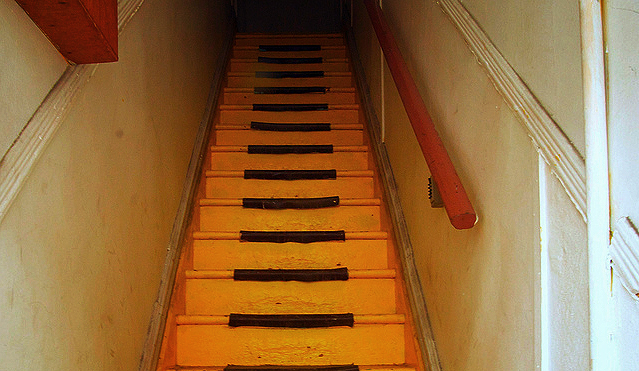A. Harding
This week Monkeybicycle is pleased to present a collection of three fiction pieces from three different authors—A. Harding, J. Robert Lennon, and Virginia Zech—on one central theme. The collective title is Falling Down the Stairs, and the pieces will run on Monday, Wednesday, and Friday. So check back on those days to keep reading.
Here’s the thing: you forgot to lock the doors last night. All of the doors must be locked, every night. The usual ones—front door, garage door, sliding glass door in the kitchen—but also the unusual ones. The mechanical room door, the basement door, the doors to all three of the bathrooms, including the half-bath that you never use; the kitchen cupboards, the pantry, the coat closet, and then upstairs, the bedrooms, even the empty ones, and the medicine cabinet doors latched, and the narrow closets barred, and the little door in the back room leading into the attic locked and barricaded with a bookcase. All of the doors must be locked, every night. You don’t like to tell people why, but you know. It’s a routine, from one end of the house to the other. All of the doors, except the usual ones, lock from the outside. Otherwise, you would lock yourself in. And then there’s your door, and it locks from both sides. When you were younger, someone would lock you in, but now that job is yours and yours alone. When everyone left, they wrote you post-it notes that said, “Don’t forget,” and stuck them all over the house. They are on the lampshades and the electrical outlets, on the radio cabinet, on each individual glass in the corner hutch. Sometimes you walk past a note and read it and remind yourself: “Don’t forget.”
But here’s the other thing: you don’t remember forgetting to lock the doors last night. Actually, you don’t remember last night. But there was a night, and it was yesterday, and now yesterday’s passed and you are standing in a hallway that you should not have been able to get to, not without the keys, and the keys are not in your hand. Your hand is not on your arm. Someone else’s hand is on your arm. Really, where did that hand come from?
So you turn around, to look at the hallway. It is empty, but longer than it usually is at this hour. You know this because you measure it every day, several times a day. The hand on your arm is, objectively, kind of a nice hand. You have always had a bit of a thing for hands. That is probably why you don’t shake it off right away—you are too busy looking at it. You are so busy looking at it that you don’t notice what it is attached to.
Typically, the hands stay in the attic. They don’t like to come down and interact with you. At least, that’s how it’s always seemed. You used to play with them, when you were younger, but everyone got upset when you’d talk about it at the dinner table. They’d tell you to go play with the cat instead. But you’ve never really liked the cat.
So you’re standing there, in the hallway, with that kind-of-a-nice-hand on your arm, looking at it. It’s been a while since you’ve seen it, and you’re trying to remember which one it is. You used to have names for them, but after a while they multiplied past the limits of your naming imagination, and you started numbering them instead. This one is probably 64, or maybe 157? You’re not sure. As you’re standing there, in the hallway, counting, the door to your left opens, with that particular low creak it always makes. In the exact moment that you turn away from the hand on your arm to look at the door, at the black space beyond it, the hand on your arm twists its grip on your shirt and shoves you into the doorway. This is a new development. This would never have happened, if you had remembered not to forget to lock the doors. But which doors? Where does this doorway go to? And you may ask yourself, Well, how did I get here?
“Here” being the top of the stairs. You are falling down the stairs. This is surprising because you could have sworn that the door that had been to your left, before it opened, led into the linen closet. You don’t remember building a staircase in your linen closet. You don’t remember forgetting to lock the doors. You don’t remember what happened to your hand, either. These are the things you think about, as you fall down the stairs. After you fall down the stairs, you don’t think about much of anything. You are in the front entryway, and the wallpaper is peeling. Someone should fix it, probably, but you don’t have enough hands for that.
At the top of the stairs, there are enough hands for that. Two or three of them reach out in the darkness, take hold of the door, and slowly swing it shut. Two or three of them pick up the keys, lock the door. They lock all the doors. There is a post-it note on the tread of the bottom step, just beside your face. “Don’t forget,” it says. You can’t actually read it, but that is what they all say, so that must be what this one says, too. If only the note had been at the top of the stairs, you might have remembered.
A. Harding spends quite a lot of time writing fiction and thinking about architecture for someone working on a Ph.D. in English literature.




